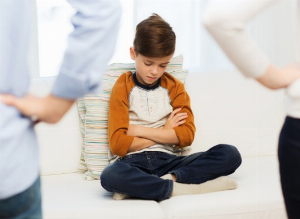Child of a toxic parent: What are the repercussions in adulthood?
Published 1 Jul 2023 • By Claudia Lima
Parents are responsible for raising and educating their children, and preparing them for adult life. They are their children's primary carers, and also their legal guardians. So, in a family, the place given to parents is very important.
In some families, the relationship between parents and children can be toxic, which has an impact on the development of the child and then the adult.
What does it mean to be a toxic parent? What are the consequences for children? What impact does it have on their adult lives? What are the solutions for moving on?
Looking for answers? Read our article!

The toxicity of a relationship can be found in different areas of daily life ( work, friendships, family or romance). A relationship is said to be toxic when it causes suffering for the person within it. The suffering may be physical or psychological, taking on a pervasive character that will impact the person's daily life.
What does it mean to be a toxic parent?
Parents are, above all, human beings, so they are imperfect, and have their own challenges.
Some parents, consciously or unconsciously, can cause trauma in their children. They can inculcate limiting beliefs and repetitive dysfunctional patterns. The toxicity of a parent-child relationship lies in the violence of verbal and non-verbal behaviors.
This is known as "toxic parenting", which is not a medical term.
There can be many reasons why some parents may become toxic, such as unresolved personal problems, mental disorders, a history of abuse, a lack of positive parental role models, or an inability to manage the challenges of parenthood in a healthy way.
A child's parents are considered toxic because of the emotional discomfort they generate. This is caused by certain types of behavior, including :
- Constant criticism and mockery,
- Lack of affection and emotional support,
- Favoritism or rejection of a child in a sibling group,
- Constant comparison of the child to others,
- Ignoring or minimizing the child's material needs,
- Excessive control, possessiveness,
- manipulation of facts,
- Transmitting messages of guilt or shame,
- Refusal to recognize their own mistakes or take responsibility for their behavior,
- Refusal to respect the child's autonomy or independency,
- Refusal to allow children to follow their own passions and interests,
- Physical and/or verbal abuse, etc.
It's often very difficult for a parent to admit his or her toxicity.
How do toxic parents affect their children?
This toxicity, generated by the parent(s), can profoundly affect the child's life. Their actions are not isolated events, but patterns of behavior that negatively influence their child's life.
Indeed, family, whatever form it takes, has an impact on the child's sense of self-esteem, on the perception of others and the trust they inspire, as well as on the child's general view of the world.
As a result, children can suffer from emotional disorders, difficulties in building healthy relationships with others, and self-confidence problems. Some suffer from attention problems, irritability, depression and, sometimes, a loss of alertness.
What impact do toxic parents have on children as adults?
These impacts can vary from person to person. Some may be more vulnerable than others, depending on their personal history and environment.
In adulthood, after living with one or more toxic parents, you may feel that you don't know yourself well, or that you've disappointed your parent, that you're not good enough for them. We can also fall back into toxic relationships in our love or friendship life.
Some people :
- Psychological disorders: depression, anxiety,
- Emotional states linked to fear, shame, anger or guilt,
- Difficulty establishing healthy relationships with others, including partners, friends and colleagues,
- Problems with self-confidence and self-esteem,
- Self-destructive behaviors such as addiction (alcohol, drugs, medication) and eating disorders, among others,
- Avoidance and withdrawal behaviors, etc.
What can be done about the consequences of toxic parents?
These emotional traumas can be overcome, although they take time and effort. What's more, acknowledging difficult aspects of one's childhood can be painful, and arouse a range of emotions one might not expect.
Nevertheless, it's essential to release negative emotions and behaviors that can have detrimental consequences for mental health and personal development.
You need to know how to ask for help when you need it, and seek support from a psychologist or counsellor and, perhaps, start behavioral therapy.
Building a healthy support network (family, friends) is also recommended, to help replace negative relationships with toxic parents.
Living in a toxic family does not predispose you to becoming a toxic parent. On the contrary, it is possible to use one's painful past to avoid repeating the same family pattern.
Give it a "Like" and share your thoughts and questions with the community in the comments below!
Take care!

 Facebook
Facebook Twitter
Twitter

